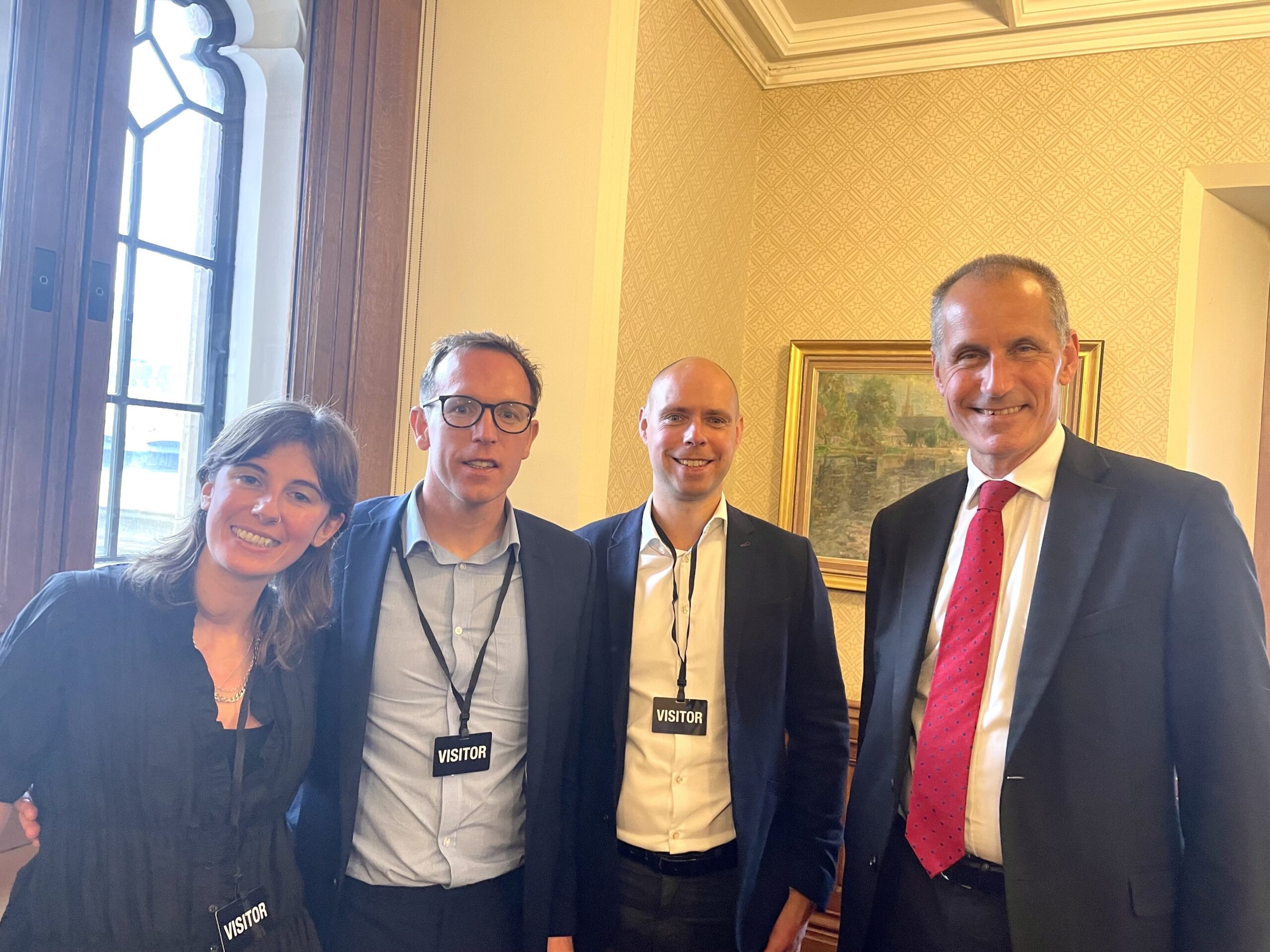Monday July 10th, 2023
On Wednesday, 22 June, we hosted a breakfast roundtable at the House of Lords in collaboration with The Entrepreneurs Network (TEN). The event was attended by founders, CEOs, and directors of some of the UK’s most innovative and fast-scaling businesses – core wealth and job creators for the country’s economy.
Philip Salter, Founder of TEN, chaired the discussion, and our guest keynote speaker and policymaker was Bill Esterson, Labour MP for Sefton Central and Shadow Business and Industry Minister.
OakNorth’s Head of Regulatory and Governmental Affairs, Nick Lee, and Debt Finance Directors, Stuart Blair and Stewart Haworth were there to share their insights as experts within the financial sector. They also discussed recent experiences working with ambitious entrepreneurs across various industries and regions.
The theme of the discussion: ‘What can policymakers and financial institutions do to serve the mid-sized?’ is a point of passion for both OakNorth and TEN, making it the perfect entry point for our first partnership.
Mid-sized businesses often suffer the same fate as the middle child. Governments and many lenders forget they exist until they’ve become big enough to be important to them. OakNorth was founded on the back of this sentiment. When our two co-founders successfully scaled their business but failed to secure debt from a UK bank, the penny dropped. The result? In just over 8 years, we’ve lent over £9.7bn to these wealth-creators and innovators. You can read more about our story here.
Below, we summarise some of the most important and valuable talking points, from business leaders at the roundtable discussion.
“Profitable scaling business should be the Goldilocks for government: big enough to boost productivity, small and nimble enough to evolve and innovate.”
The fact that mid-sized businesses provide sustainable and long-term jobs bolster local GDPs, lead in innovation, and manage to grow, is despite the UK landscape, not because of it. Big corporations have the resources, talent, time, and influence to lobby the government. And over the years, the focus and support for SMEs has slowly but surely improved, giving them earlier access to grants, networks, communities and growth incentives.
Meanwhile, the current zeitgeist is an unbridled devotion to supporting loss-making, equity-backed tech businesses. Unfortunately, this AI-centric bubble has come at the cost of supporting well-established and profitable scaling businesses in core sectors such as manufacturing, life sciences, retail and construction, just to name a few.

“Far too often, we hear about successful businesses that move out of the UK to grow their influence.”
If AI is the buzzword of choice at every other event, roundtable, and conference, then ours was IPO (initial public offering) – or rather, ‘what makes the UK a desirable place to grow and exit a business?’ Last month, the news of the British chip manufacturer Arm’s, New York listing exacerbated existing frustrations and emphasised the inherent problems with scaling a business to the point of exit. Seeing profitable businesses head across the pond, taking jobs and economic prosperity with them, is a sure enough warning for any government to take action.
Around the table, there was a wide-reaching consensus that while this country is undeniably fertile ground for startups, the barriers that scaling businesses face, especially when accessing liquidity, talent, and supply chains, is not only a thorn in their side but should be a thorn in the subsequent governments. And, if, in the words of Bill Esterson, ‘our economy isn’t firing on all cylinders’, then it’s likely this lack of support for profitable established businesses is just one of the reasons why.
So, to keep impressive businesses in the UK, there needs to be a focus on a few core areas:
- Attracting the right investment from the private sector (such as pension funds)
- Focusing on UK talent – How can we bring more talent into the UK and nurture the talent we already have?
- Bringing down supply chain costs and overhauling the UK’s procurement process.
“How can we stop harming wealth creators and focus more diligently on fairer regulation, taxation and incentivisation?”
It didn’t take too long to address the elephant in the room – the imbalance between big corporations and scaling businesses, especially regarding regulation, taxation and incentivisation. Many founders raised the issues they’d faced first-hand with the current ‘one size fits all approach’ to regulatory policy.
Most attendees admitted that government and regulatory bodies treat them the same as global gargantuan businesses. They’re expected to understand and comply with overly complex, bureaucratic regulations and taxation. But, unlike the big players, they’re not in the fortunate financial position to outsource it all to a ‘big five’ firm.
Aside from tax complexities, it’s unsurprising that the amount of taxes that mid-sized businesses pay was a unanimous pain point. Corporation and property tax were the first to be discussed, but certainly not the only issues at play. It’s not a coincidence that the first thing that returns on a quick Google search for ‘import taxes Brexit’ is a sponsored ad for a ‘big five’ firm’s services.
The new import and export taxes that have hit businesses post-Brexit are causing so many headaches that some business owners have given up altogether. Some have even put international expansion plans on ice until they have the finances and expertise to understand new trading regulations.
Without rehashing old-hat Brexit debates, one question for Bill Esterson, MP was whether a referendum was on the cards if Labour won the next general election. His answer was one echoed in sentiment by his close colleague, Rachel Reeves, Shadow Chancellor of the Exchequer, and party leader, Sir Keir Starmer.
A referendum would be a waste of time; it would create the same circumstances that we’re already suffering from – stagnation, indecision, anaemic growth and worse, market uncertainty. So, what would labour do about the Brexit debacle? In theory, the answer was simple: ‘Make Brexit work for businesses.
“Hospitality became a dirty word; nobody was willing to lend to the sector, even if the numbers told a positive story.”
When it comes to liquidity, many businesses are still recovering from debts caused by the coronavirus pandemic. And although many resilient companies are still in a position of growth, their access to grants, debt finance, or government-backed financing has dried up, so they have no choice but to rethink their strategies, and in some cases, pause any expansions.
‘Hospitality’, which suffered the most during the global pandemic, but had the biggest recovery arc, has somewhat sadly become a ‘dirty word’ for some incumbent lending institutions. Despite the term covering everything from spas, golf courses, gyms and hotels and restaurants, traditional banks continue to paint fundamentally different businesses with the same brush.
At OakNorth, we used a forward-looking view of risk and a granular data-driven approach to credit analytics to confidently lend responsibly throughout an incredibly challenging economic period. This meant we continued supporting expert and incredibly agile management teams across a range of sectors, including hospitality, that pivoted their offering to continue trading during the coronavirus pandemic. And because of our partnership, these businesses were able to increase their market share and explore new untapped growth opportunities.

“Stop spinning on a sixpence! Why businesses and markets need stability, above all else.”
After the Mini Budget of September 2022, also known as the budget ‘that broke Britain’, which took the pound to its lowest-ever level against the US dollar and made Lizz Truss the shortest-serving prime minister, the markets were spooked. Investors made very little of the budget’s substantial tax cuts, increased public borrowing, and disregard for the Bank of England’s continuous efforts to control inflation with controlled growth rates.
But rather than getting tax cuts, UK businesses instead got pummelled with even more bad news – a deep-seated economic crash, a rock bottom pound, and even more political u-turns.
Why is this still relevant now? Besides the fact that UK consumers and businesses are still feeling the shock of the Mini Budget of 2022, with a cost of living crisis and increasing inflation, companies no longer have the same trust in the government. While most leaders around our table called for more government-backed support for scaling businesses, some felt that the political uncertainty, which spiralled out of control in September 2022, could easily be repeated.
This mindset left them thinking the best thing the government could do to support businesses was to ‘not cause any surprises’. And for a few people, that meant as little government intervention as possible – even if that meant no changes to taxation or regulation. Although opinions were nuanced, it was clear that everyone in the room valued stability as one of the highest business needs. Even above tax reforms, political stability was deemed essential to sustainable growth.
“Sleepless nights, second mortgages and no-Sunday rest – why can’t the UK celebrate entrepreneurialism in the same way as the US?”
This event was deliberately a space of venting, a place where leaders could let their blood–boiling business frustrations pour out and be heard by us, and by policymakers and political leaders. But with every hurdle (there were many) and every gripe and challenge raised, it was hard not to revel in the sheer enormity of talent in one room. Entrepreneurs from so many different walks of life are scaling and innovating at such a breakneck pace, breaking into new sectors, revitalising older ones, and unravelling new technologies, all for the joy of it.
What unified them? The insanity it takes to become a founder and the passion to pursue it when things get tough. The 3am scaries, remortgaging their homes, not paying themselves a salary for the first five years, and getting their first non-family member on the payroll. The trials and tribulations of bootstrapping their way to the top. This rare mentality was something they all tapped into, something that made the table buzz and whirr with excitement, even if things weren’t looking rosy right now.
It left us questioning Bill, and one another, why is the UK holding back, scared even, to celebrate its entrepreneurs? What can we learn from the US about incentivising the next great generation of doers, makers and innovators?
It all starts from that – if we grow a culture that celebrates brave, bold entrepreneurs, only then can we begin to understand them better, help them flourish and see whole economies reap the benefits.
To learn more about our entrepreneurial mindset, read our recent interview with our Co-founder, Rishi Khosla.
Want to grow with OakNorth? Check out our business loans.